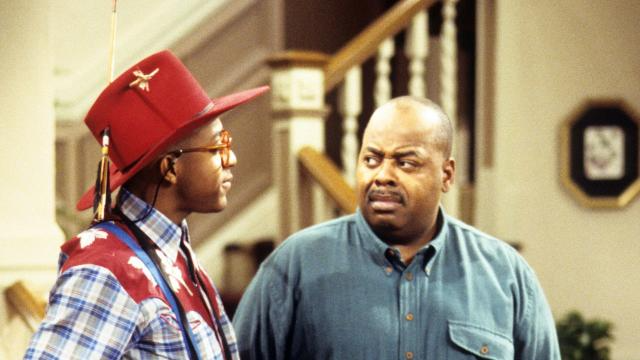
Remember Reginald VelJohnson? He was the go-to actor to play cops in the ’80s and ’90s. You know, Carl from Family Matters. This guy:
If you count his role as a prison guard in 1984’s Ghostbusters (and we do), VelJohnson went on to play a cop about a million and three times. Take a look at his resume: Policeman at a courthouse in a Kojak TV movie, Captain Graff in 1987’s Plain Clothes, followed by his memorable turn as Sgt. Al Powell in 1988’s Die Hard. In 1989 he appeared as Carl Winslow on Perfect Strangers, a role he would reprise in Family Matters later that same year, lasting until 1998. And that’s just the tip of the Carlsberg.
Here’s a question that might get a little mind-fucky: What if all of those officers weren’t different characters? What if Reginald VelJohnson was playing the same hapless character over and over, creating the most mentally disturbed police officer ever, all stemming from the trauma of an accidental shooting and his knowledge of the paranormal and life after death?
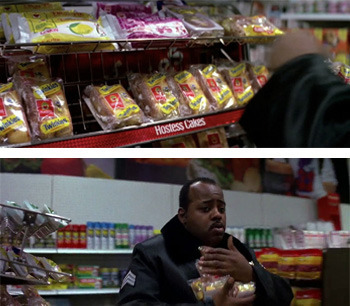
Al Powell Is Traumatized By Egon’s Explanation Of Paranormal Activity In Ghostbusters
Al Powell starts off as a mild-mannered cop working in New York in 1984:
One day he’s tasked with escorting four scientists to the mayor’s office — the Ghostbusters. The reason? As Al himself states, “The whole island’s going crazy.” That’s your “No shit, Sherlock” assessment of what happens after the EPA and Agent Walter Peck shut off containment in the Ghostbusters’ basement, releasing a monumental amount of pissed-off spirits in Manhattan.
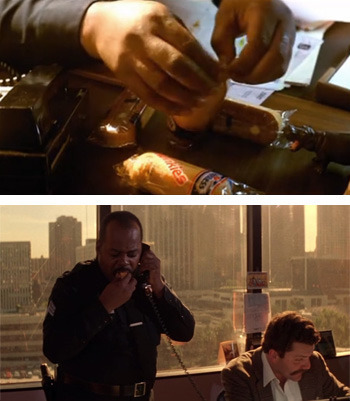
It’s safe to assume Powell hears at least part of what Egon and crew are explaining to each other and the assorted men in lock-up about what’s happening, and that includes a Sumerian god showing up to destroy humankind. That’s a hell of a lot of crap to take at work. And of course you’d never believe it, unless you were in New York at the time, where walls are bleeding and the dead are routinely covering people in ghost snot. Al Powell would have no reason not to believe what these four men, summoned by the mayor himself, are saying.
If we know nothing else about Powell, we know he’s a talkative man — it’s a key aspect of his character in Die Hard (we’ll get to that shortly). So he probably would have chatted with the Ghostbusters and got their side of what was happening, including the layman’s explanation Egon already offered earlier in the film, aka the Twinkie.
Thus begins Powell’s long and deranged obsession with the Twinkie. The Twinkie that, over time, comes to represent evil and badness in his mind. The Twinkie is where horror comes from. The Twinkie must be contained.
Since Al Powell is already at the mayor’s office when the Ghostbusters say they need an escort to Central Park West, he would also be at the scene when Gozer comes back in the form of a 100-foot-tall Marshmallow man. In the span of a day Powell has come to learn definitively that there is an afterlife and it’s not necessarily a pleasant one, and also that demonic, trans-dimensional gymnasts could, at any moment, cross into our reality and kill us all in the most comical way Dan Aykroyd can think of. This is more than a simple beat officer is meant to be able to deal with.
Powell Moves To L.A., Starts Eating A LOT Of Twinkies
Powell has a mental breakdown and leaves New York. The stress of the normal job is high, but a marshmallow man is too much. He moves to L.A., where he develops a deeply psychological need to devour Twinkies as much as possible, ensuring they can never grow big and threaten mankind again.
No amount of cream filling is going to fill that inner void.
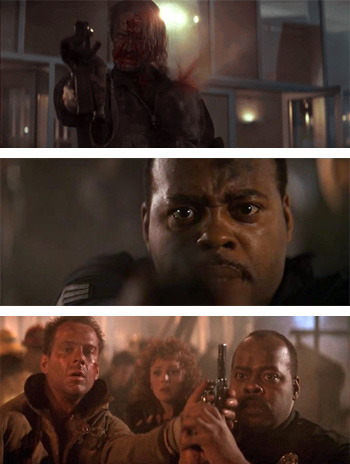
When we first meet Powell in Die Hard, he’s buying Twinkies. Not just a two-pack like a normal person who hates himself but as many as he can carry, which he tries to brush off by telling the clerk they’re for his pregnant wife. But later in the film he demonstrates an encyclopedic knowledge of the ingredients inside a Twinkie when he rattles them off after McClane makes an offhanded remark wondering what’s in them. This demonstrates Powell is intimately familiar with the Twinkie. He’s memorized the list of ingredients.
How many Twinkies would a man need to eat before he managed to memorize the ingredients down to polysorbate 60?
Further proof: Powell’s cameo in Die Hard 2 has him sitting at a desk festooned with Twinkies as he takes a call from McClane.
Festooned!
In his mind the Twinkie connection (and also the obvious junk food connection of NYC being attacked by a junk food mascot) is the cause of paranormal destruction. He is unconsciously trying to prevent it by eating as many as he can.
This Leads To The Shooting And Subsequent Fantasy Family
So shaken is Powell by his experience in New York, he ends up shooting a child in the line of duty, an event that further damages his psyche and gets him put on desk duty.
Not only does Powell tell the clerk at the store that he has a pregnant wife, he tells the same thing to McClane.
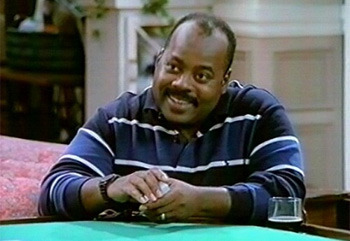
Notice you can clearly see Powell’s hands in the video as he takes the bag and puts the change in a charity container. No wedding ring on either hand. And later, when Deputy Police Chief Dwayne T. Robinson is trying to get Powell off the scene, Powell claims you couldn’t even drag him away. Doesn’t a man with a wife and a child on the way have more to lose? Wouldn’t the deputy chief of police know this?
The Shooting Of Karl
So until now, Al Powell seems to keep it together as well as can be expected, considering the mindfuck circumstances. But the fabric of his reality comes crashing down with a single event, set into motion, incidentally, by a character played by William Atherton, the actor who played the dickless EPA agent responsible for the near-destruction of New York City. In L.A. his dickless reporter character digs too deep into McClane’s backstory, putting the entire Nakatomi Tower and everyone involved in the attack at risk. It is his presence that cues Powell’s breakdown. In this second case, it’s manifested in the shooting of Karl, the bad guy from Die Hard who isn’t Alan Rickman.
Remember, at the time he shoots Karl, he is already traumatized from his past incident of shooting an innocent kid. Being forced to use his gun again makes him snap. Unable to find peace on either coast, Sgt. Al Powell recedes deeper into his own mind and creates a safe place in between his two tragic events. He imagines himself a family man in Chicago, still a cop but one where his duties never interfere with a solid, loving home life. And not just a pregnant wife, either. Here he has a wife, three kids, a sister-in-law, and his mother all surrounding him to give him support whenever and for whatever he needs. He’s a family man dealing with family matters. He’s not Al Powell. He’s Carl Winslow, a man never attacked by terrorists or spirits of the undead.
Powell’s overwhelming guilt at having shot another person — Karl — and the implications of what it means for his victim in the afterlife cause Powell to become a new Carl in his own mind. Someone who can live out a peaceful, happy life.
And he wears a wedding ring this time.
